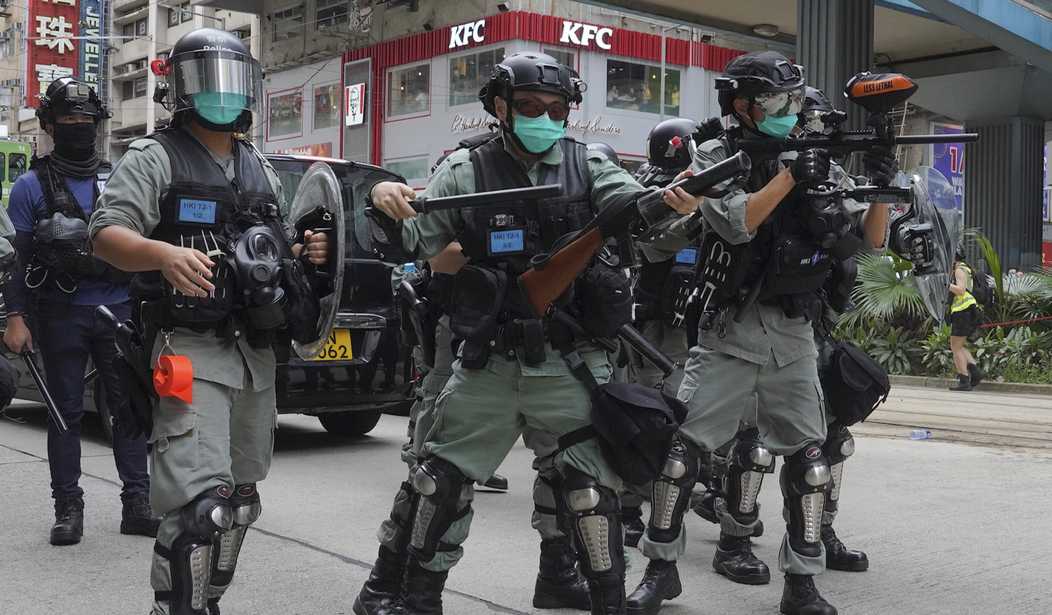The city of Hong Kong passed a new national security law that will create stiff penalties for many types of political crimes. The new law "allows for closed-door trials, gives the police rights to detain suspects for up to 16 days without charge and penalties including life sentences, among other things," according to the BBC.
China has been using the passage of this law for years as a threat against democracy groups. Now, it's all but certain that the democracy movement in Hong Kong will be driven further underground.
"The new national security legislation is going to double down the repression on freedoms in Hong Kong with extended egregious sentences and a broadened definition of national security," said Frances Hui. Hui is a Hong Kong activist now based in the United States who described the legislation as a "final nail in a closed coffin."
In case anyone is interested, this is exactly what China promised they wouldn't do when they took control of the island from Great Britain in 1997.
It's taken Beijing more than 26 years to accomplish the goal of snuffing out independent thinking in Hong Kong. It's an example of how China's patience will eventually lead to its takeover of Taiwan. They won't have to go to war to do it. Eventually, the U.S. will tire of defending Taiwan and it will fall into China's lap.
The Chinese take a long view of everything. It's what happens when your country has been in existence for 4,000 years.
A group of 81 lawmakers from across the world, including the United States, Canada, and South Korea, issued a joint statement on Tuesday expressing "grave concerns" over the legislation.
"The legislation undermines due process and fair trial rights and violates Hong Kong's obligations under international human rights law, jeopardizing Hong Kong's role as an open international city," the statement said.
New crimes such as treason and insurrection carry life sentences, expanding the authorities’ toolkit to crush political opposition — a drive that’s hurt the city’s ties with some Western democracies in recent years. The legislation’s broadly defined state secrets offenses bring Hong Kong in line with China’s vague legislation around espionage, which has spooked foreign investors over the past year.
“Economic and financial markets are based on the free flow of information,” Thomas Kellogg, executive director at the Georgetown Center for Asian Law, said before the measure’s passing. “The new state secrets provisions could put a significant damper on both economic and financial news and information flows in Hong Kong.”
In 2020, Beijing imposed a new national security law on Hong Kong that resulted in hundreds of pro-democracy lawmakers, activists, and media publishers being arrested or forced into exile. The law came on the heels of the massive pro-democracy protests of 2019 that terrified China and gave hope to democracy activists.
Now, the protests are a thing of the past. No one dare speak out. And some of the city’s economic and social development information can now potentially be deemed a state secret. This would put a further damper on the investment environment which is already seeing a large drop-off.
Also for our VIPs: Gambia Looks to Revoke the Ban on Female Mutilation
In defense of the new legislation, the government says it is merely following the Basic Law—Hong Kong’s miniconstitution. So notwithstanding Hong Kong’s underperforming stock market and a flight of foreign investors, the government decided it needs more tools to lock people up. The law’s reach is sweeping and its terms such as treason and insurrection are conveniently vague.
Chief Executive John Lee says he can now turn his attention to the economy, but it may be too late. Regarding foreign influence as a threat is incompatible with a world financial center whose prosperity is rooted in the rule of law and openness to foreign capital. Enter Hong Kong at your own risk.
For its part, China has tried to gloss over the foreign criticism of the law by claiming it's "exaggerated." Beijing says it is "unswervingly determined to safeguard national sovereignty, security and development interests, implement the 'one country, two systems' policy, and oppose any external interference in Hong Kong affairs."
One country. One system. One, giant gulag.










